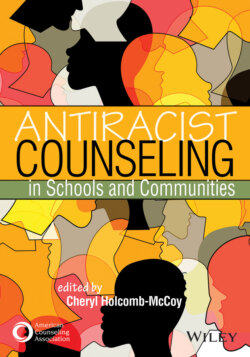Читать книгу Antiracist Counseling in Schools and Communities - Группа авторов - Страница 41
Conclusion
ОглавлениеCounselor educators must challenge the traditional counseling canon to create the more inclusive, representative, and equitable curriculum that students deserve— one that stimulates students to doubt, challenge, and reject preconceived notions of objective knowledge claims derived from Western episteme. The following strategies can be used to help counselors develop a political critical standpoint:
1 Acknowledge that the counseling profession is neither sociopolitically neutral nor immune to the influence of Western racial ideologies that support a racist status quo.
2 Acknowledge that your own knowledge is (to a certain degree) situated in dominant perspectives and social and political experiences that shape how you see and understand the world and determine which behaviors, values, worldviews, paradigms, sets of beliefs, and practices of others are considered healthy, credible, and relevant.
3 Familiarize yourself with components of counseling theories that (a) consider the social determinants of mental health and need to modify environmental conditions conducive to pathology; (b) question the capacity of the present social system to enhance the well-being of Blacks, Indigenous people, and people of color; and (c) critique socially structured inequalities and their psychological effects (Prilleltensky, 1994).
4 Use critical race theory as an interpretive lens to analyze and critique the Western hegemony embedded within the counseling canon, such as (a) whiteness as normative and nonracial; (b) the silence of marginalized narratives; (c) liberal principles of neutrality, fairness, and meritocracy; (d) color blindness; and (e) the inextricability of race, power, and privilege (e.g., Crenshaw et al., 1995).
5 Seek insights from Black feminism and Black feminist epistemologies/counseling practices to (a) develop a critical lens and language with which to scrutinize the ideological repercussions of psychology, (b) examine previously ignored issues, (c) formulate and test new (and old) hypotheses, and (d) develop alternative theoretical paradigms that are sensitive to the realities and contextualized lives of oppressed groups (e.g., Thomas, 2004).
6 Plan for and engage in racial justice action that goes beyond merely developing a political critical standpoint.
